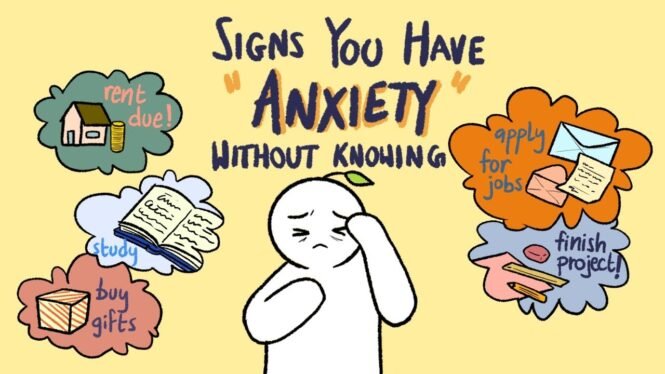Do you ever feel constantly on edge, but can’t quite pinpoint why? Do you find yourself overthinking and worrying excessively about small things? These could be subtle signs of anxiety that you might not even realize. Anxiety affects millions of people worldwide, but it’s not always easy to recognize the symptoms. In this blog post, we will explore five subtle signs that you may have anxiety but don’t know about it. By recognizing these signs, you can take the first step towards managing your anxiety and improving your overall well-being.
5 Subtle Signs You Have Anxiety But Don’t Know About It
Introduction
Anxiety is one of the most common mental health disorders, yet it often goes undiagnosed. This is because anxiety can manifest in subtle ways that people may not realize are related to their mental health. In a recent video, a team of experts explained five subtle signs of anxiety that people may not be aware of. In this article, we’ll delve deeper into these signs and discuss why it’s important to identify and address anxiety.
Sign #1: Muscle Tension
One subtle sign of anxiety is muscle tension. When you’re anxious, you may hold your muscles tight, especially in your shoulders, neck, and jaw. This tension can lead to headaches and even chronic pain. To relieve muscle tension, try stretching, gentle exercise, or a massage. It’s also important to practice relaxation techniques like deep breathing or meditation to reduce overall anxiety levels.
Sign #2: Constant Need To Be Busy
Another subtle sign of anxiety is the constant need to be busy. People with anxiety may feel like they always need to be doing something, whether it’s working, cleaning, or checking their phone. This can be a way to distract themselves from anxious thoughts or feelings. However, this constant busyness can actually increase anxiety levels over time. It’s important to take breaks and practice mindfulness to reduce the urge to always be doing something.
Sign #3: Catastrophizing
Catastrophizing is a common thought pattern in people with anxiety. It involves imagining the worst-case scenario in any situation, even if it’s unlikely to happen. For example, someone with anxiety may worry about a minor headache being a sign of a serious illness. Catastrophizing can cause unnecessary stress and anxiety. To combat this thought pattern, try to focus on realistic outcomes and evidence-based solutions.
Sign #4: Self-Medicating
Self-medicating is another subtle sign of anxiety. People with anxiety may turn to alcohol, drugs, or even excessive caffeine to numb or distract themselves from anxious thoughts or feelings. This can lead to addiction and exacerbate anxiety symptoms over time. If you’re struggling with self-medicating, it’s important to seek help from a healthcare professional, therapist, or support group.
Sign #5: Social Isolation
Finally, social isolation is a subtle sign of anxiety. People with anxiety may avoid social situations or spend excessive amounts of time alone. This can be a way to avoid triggers of anxiety or to avoid being judged or criticized by others. However, prolonged social isolation can worsen anxiety symptoms and lead to depression. To combat social isolation, it’s important to seek support and connect with others through activities you enjoy.
Conclusion
Anxiety can manifest in subtle ways that people may not realize are related to their mental health. Muscle tension, constant need to be busy, catastrophizing, self-medicating, and social isolation are just a few examples. It’s important to identify and address these signs of anxiety in order to improve overall mental health and well-being. If you’re concerned about your mental health, seek support or consult a healthcare professional.
FAQs
- Is anxiety a common mental health disorder?
Yes, anxiety is one of the most common mental health disorders.
- Can anxiety affect daily life if not addressed?
Yes, anxiety can affect daily life and lead to decreased quality of life if not addressed.
- What are some techniques for relieving muscle tension caused by anxiety?
Stretching, gentle exercise, and massage can help relieve muscle tension caused by anxiety.
- Is self-medicating a healthy way to cope with anxiety?
No, self-medicating can lead to addiction and worsen anxiety symptoms over time.
- How can I combat social isolation caused by anxiety?
It’s important to connect with others through activities you enjoy and seek support from a therapist or support group.
Christopher Conway, the innovative mind behind “Love Blueprints,” is a seasoned relationship expert and author. His insightful guidance, drawn from years of experience and study, offers transformative strategies for modern love and dating. Christopher’s commitment to enhancing romantic connections has made “Love Blueprints” a go-to resource for those navigating the complexities of relationships.




